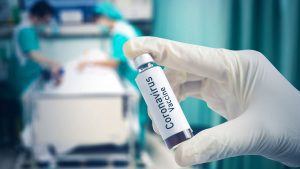
Prime Minister Denys Shmyhal says the government is actively developing mechanisms for stable supplies of food, medicine and essential goods throughout the country.
“Now the government is actively developing mechanisms for stable supplies of food, medicine and essential goods throughout the country,” Shmyhal said in a video message on Wednesday afternoon.
According to the prime minister, at the moment the Coordinating Center for the Provision of Food Products, Medicines, Drinking Water and Fuel is operating under the leadership of First Deputy Prime Minister and Minister of Economy Yulia Svyrydenko, and the Humanitarian Aid Coordination Center is also operating under the leadership of Deputy Prime Minister for European and Euro-Atlantic Integration Olha Stefanishina.

Minister of Culture and Information Policy Oleksandr Tkachenko initiates a meeting of media representatives with the Ministry of Health and the National Security and Defense Council to discuss a future moratorium on the advertising of medicines and medicines.
“Regarding the moratorium on advertising of drugs and medicines, which should be developed by the Cabinet of Ministers on behalf of the National Security and Defense Council. As an ex-media person, I understand perfectly well that this advertising is 30% of the income of TV and other media. That is why the Ministry of Culture and Information Policy will soon initiate a meeting of media people with the Ministry of Health and the National Security and Defense Council to hear the opinion of the media people themselves,” Tkachenko wrote in the Telegram channel.
The Minister also said that any business, including television, should be socially responsible, and self-medication has nothing to do with responsibility in any civilized country.
According to him, the development of the mechanism will last until the end of the year, and the moratorium itself should be introduced by January 1, 2024.
“There is a transition period and it will be used effectively. In the dialogue with the representatives of media companies we will find a way to implement these changes with minimal losses. First of all, for them,” Tkachenko said.

The Ministry of Health, together with the State Service for Medicines and Drug Control, have developed a draft resolution of the Cabinet of Ministers on the introduction of electronic trade in medicines, Deputy Health Minister Ihor Ivaschenko said during a press briefing in Kyiv on Monday.
“The Ministry of Health, together with the State Medicines Service, developed and submitted to the Cabinet of Ministers a draft resolution on amending the licensing conditions for the implementation of economic activities for the production, import, wholesale and retail trade of medicines, as well as their delivery to the end consumer. This is the so-called introduction of electronic trading in medicines and their delivery to patients,” he said.
Ivaschenko also said that the draft resolution provides for the possibility of entities that carry out retail trade in pharmaceuticals to carry out electronic trade in pharmaceuticals and ensure their delivery to end consumers.
“The draft resolution itself provides for the establishment of appropriate requirements for licensees, which, first of all, will relate to the availability of pharmacies, appropriate premises for the implementation of electronic commerce, the availability of material and technical equipment for transportation and delivery, or the possibility of concluding agreements with postal operators for the implementation of such transportation,” the deputy minister said.
“The draft resolution details the requirements for the website on which orders can be made, as well as requirements for persons who will accept and form orders. Additionally, it sets requirements for the delivery of medicines and the possibility of consulting patients,” Ivaschenko said.

The Health Ministry of Ukraine has allowed clinical testing of four domestic medicines with the aim of studying their effectiveness for patients diagnosed with coronavirus (COVID-19).
These medicines include Amizon Max, Amixin IC, Bioven and Corvitin, Health Minister of Ukraine Maksym Stepanov said during a press briefing on Monday.
“Some clinical trials are at the final stage. As soon as results are obtained, conclusions on a possibility of using these medicines for treatment of the coronavirus disease will be made,” the ministry said.
The Health Ministry also monitors the information about the development of COVID-19 vaccines in the world. There is no such vaccine at the moment. AstraZeneca has announced its plans to produce the vaccine. Four countries (Germany, France, Italy and the Netherlands) have created an alliance and preordered the vaccine.
“Ukraine has also addressed these countries with a request for putting our country on the priority list for obtaining the vaccine when it appears,” the ministry said.

Pharmaceutical manufacturers of Ukraine register clinical trials of medicines for the treatment of coronavirus (COVID-19), Health Minister Maksym Stepanov has said.
“There are internal enterprises that register clinical trials of medicines, which they produce in our country. Currently, they are Farmak, Borschahivsky Chemical Pharmaceutical Plant, Darnitsa pharmaceutical company, Biopharma and Interchem. They are trying to create medicines to treat COVID-19, including symptomatic ones. For example, Darnitsa brought in a substance for the production of hydroxychloroquine, while Biopharma registered a clinical trial of Bioven,” he said during a press briefing in Kyiv on Wednesday, May 13.

Legalization of drug delivery by certified postal operators amid quarantine will reduce the spread of the disease, according to the Manufacturers of Medications of Ukraine Association.
“This issue becomes especially relevant in the situation when it is necessary to limit unnecessary contacts as much as possible, because a pharmacy becomes one of the places of active contacts. This is especially important for elderly people who urgently need medicines and form the basis of the risk group,” head of the association Petro Bahriy said.
He noted that “the de facto delivery of medicines purchased online exists, but is illegal.”
“Such a service needs to be legalized so that people who need medicines can be quarantined,” he said.
According to the expert, the legitimization of such a delivery will guarantee the quality, origin of drugs and compliance with the mandatory logistic requirements, while involving all certified operators in the delivery will allow delivering drugs quickly and on time.
Director General of InterChem pharmaceutical company (Odesa) Anatoliy Reder, in turn, noted that attracting all the postal operators of Ukraine to the delivery of medicines will enable the widest possible delivery with a significant limitation of contacts and the spread of coronavirus.
According to him, this option will allow people living in remote and rural areas to “get their medicines at the right time and with the guaranteed quality.”
Reder believes that the possibility of delivery will not have a significant impact on the price of drugs.
CORONAVIRUS, DELIVERY, LEGALIZATION, MEDICINES, POSTAL OPERATORS